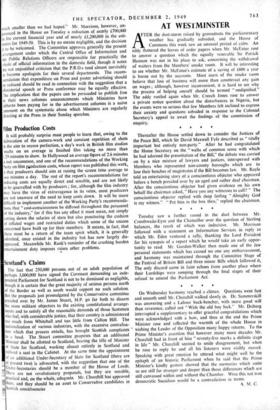A FTER the dust-storm raised by groundnuts the parliamentary weather has
gradually subsided, and the House of Commons this week saw an unusual period of calm. An eddy fluttered the leaves of order papers when Mr. McEntee rose to answer a question which the equally venerable Sir Patrick Hannon was not in his place to ask, concerning the withdrawal of waiters from the Members' smoke room. It will be interesting to see whether Mr. McEntee's estimate of a saving of £600 a year is borne out by the accounts. Most users of the smoke room believe that loss of business will more than counteract any gain on wages ; although, however inconvenient, it is hard to see why the process of helping oneself should be termed " undignified." The eddy rustled again when Mr. Creech Jones rose to answer a private notice question about the disturbances in Nigeria, but the events were so serious that few Members felt inclined to express their anxiety and questions subsided in response to the Colonial Secretary's appeal to await the findings of the commission of enquiry.
* • Thereafter the House settled down to consider the Justices of the Peace Bill, which Sir David Maxwell Fyfe described as " vitally important but entirely non-party." After he had congratulated the Home Secretary on the " wafts of common sense with which he had adorned the presentation of the Bill," the debate was carried on by a nice mixture of lawyers and justices, interspersed with Members who represented non-county boroughs which are to lose their benches of magistrates if the Bill becomes law. Mr. Royle told an entertaining story of a conscientious objector who appeared before a bench presided over by an aged and rather deaf chairman. After the conscientious objector had given evidence on his own behalf the chairman asked, " Have you any witnesses to call? " The conscientious objector replied with deep feeling " Almighty God is my witness." " Put him in the box then," replied the chairman.
Tuesday saw a further round in the duel between Mr. Crosthwaite-Eyre and the Chancellor over the question of Sterling balances, the result of which was indecisive. Mr. Morrison followed with a statement on Information Services in reply to which Mr. Eden ventured a sally, thanking the Lord President for his synopsis of a report which he would take an early oppor- tunity to read. Mr. Gordon-Walker then made one of the few personal statements which has caused no one any embarrassment, and harmony was maintained through the Committee Stage of the Festival of Britain Bill and three minor Bills which followed it, The only discord came in faint echoes from another place where their Lordships were romping through the final stages of their refusal to amend the Parliament Act.
* * * * On Wednesday harmony reached a climax. Questions went fast and smooth until Mr. Churchill walked slowly in. Dr. Summerskill was answering and a Labour back-bencher, with more good will than reverence, called out " Wish the old boy luck." Mr. Driberg interrupted a supplementary to offer graceful congratulations which were acknowledged with a bow, and then at the end the Prime Minister rose and reflected the warmth of the whole House in wishing the Leader of the Opposition many happy returns. To the Prime Minister's assertion that however many more decades Mr. Churchill had in front of him " seventy-five marks a definite stage in life " Mr. Churchill seemed to smile disagreement, but when he rose to reply he and all his listeners were visibly moved. Speaking with great emotion he uttered what might well be the epitaph of an historic Parliament when he said that the Primo Minister's kindly gesture showed that the memories which unite us are still far stronger and deeper than those differences which are still canvassed within and without the Chamber. Were this not true democratic Socialism would be a contradiction in terms.


































 Previous page
Previous page